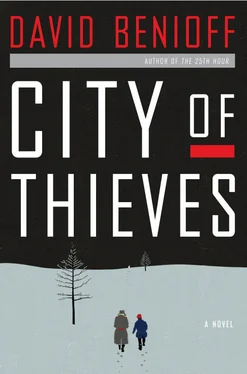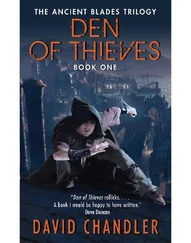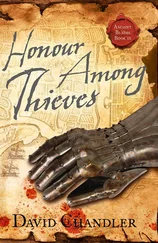We stepped to the other side of the shed, sidled around the muttering peasants, and looked down at the man still lying there. It was Markov’s accuser, his throat slashed, the blood long drained from his body, and his face chalk white. He must have been murdered in his sleep or we would have heard him cry out, but his eyes had popped open when the knife cut his skin; they bulged from their sockets, staring with horror at our downturned faces.
One of the peasants yanked off the dead man’s boots; a second took his sheepskin gloves; a third pulled the tooled leather belt from the belt loops on his pants. Kolya knelt down and snatched the quilted down cap before anyone else could. I turned and saw Vika adjusting her own rabbit fur cap, setting it very low on her forehead. She looked back at me for a second and walked out of the toolshed. A moment later a German trooper stepped inside, angry at the delay, ready to fire his weapon. He saw the corpse, the gaping throat, the bloodstain that started under the dead man’s back and spread across the floorboards like a pair of monstrous black wings. The murder irritated the trooper—this required an explanation for the officers. He asked a question in German, more to himself than any of us, not expecting an answer. Kolya cleared his throat and replied. I couldn’t judge Kolya’s German, but the trooper seemed amazed to hear his own language spoken by a prisoner.
The German shook his head, gave a curt response, and gestured with his thumb for us to leave the shed. When we were outside, I asked Kolya what he had said.
“I told him the peasants hate the Jews even more than your people do.”
“And what did he say?”
“‘There is a proper way of doing things.’ Very Germanic.” He was trying to fit his new cap onto his bare head; it wasn’t really big enough, but he managed to yank the earflaps down far enough so he could tie the drawstrings together.
“You think it’s smart to let them know you speak German? After what they did yesterday?”
“No, I think it’s dangerous. But at least now they won’t ask any more questions.”
The prisoners had been organized into a single-file line; we shuffled forward, squinting in the bright morning sun, toward a hulking, hungover trooper, his eyes still crusted with sleep, who handed each of us a single round biscuit, hard and dry as a lump of coal.
“A good sign,” muttered Kolya, tapping at his biscuit with his fingernail.
Soon we were marching south with the Gebirgsjäger company, heads bowed against the wind. Today we walked on the road, though the pavement was hidden beneath layers of tread-marked snow. A few kilometers from the schoolhouse we passed a sign for Mga and I pointed it out to Kolya.
“Huh. What day is today?”
I had to think about it, counting backward in my head to Saturday.
“Wednesday. We’re supposed to show up with the eggs tomorrow.”
“Wednesday…. I haven’t shit in thirteen days. Thirteen days…. What happens to it all? It’s not like I haven’t eaten anything. Darling soup and some sausages, those buttered potatoes with the girls, ration bread… What’s it doing, just sitting in my belly, a fucking lump?”
“You want to shit?” asked Edik, the old bearded peasant, who had heard Kolya’s complaints and now turned to give advice. “Boil some buckthorn bark and drink the water. Never fails.”
“Wonderful. You see any buckthorns around here?”
Edik glanced at the roadside pines and shook his head. “I’ll give a whistle if we pass any.”
“Many thanks. Maybe you can find me the boiling water, too.”
Edik had already faced front and resumed his place in the line, mindful that one of the troopers had looked our way.
“Stalin goes to visit one of the collectives outside of Moscow,” began Kolya in his joke-telling voice. “Wants to see how they’re getting on with the latest Five-Year Plan. ‘Tell me, comrade,’ he asks one farmer. ‘How did the potatoes do this year?’ ‘Very well, Comrade Stalin. If we piled them up, they would reach God.’ ‘But God does not exist, Comrade Farmer.’ ‘Nor do the potatoes, Comrade Stalin.’”
“Old one.”
“Jokes only get old if they’re good. Otherwise, who keeps telling them?”
“People like you who aren’t funny?”
“I can’t help it if you never laugh. I make the girls laugh, that’s what matters.”
“You think she did it?” I asked him. He glanced at me, confused for a moment, until he saw that I was watching Vika, who marched apart from us today, near the front of the procession.
“Of course she did it.”
“I just… She was squeezed up against me all night. When I fell asleep, her head was on my shoulder—”
“That’s as close to sex as you’ve ever been. You see that? You’ve listened to me, you’ve learned.”
“—and somehow she managed to get away from me, and I’m a very light sleeper, crawl around thirty peasants in total darkness, cut the man’s throat, and come back? Without waking a single person?”
Kolya nodded, still watching Vika, who walked alone, scanning the roadside and the position of the German troops.
“She’s a talented killer.”
“Especially for an astronomer.”
“Ha. Don’t believe everything you hear.”
“You think she’s lying?”
“I’m sure she went to university for a while. That’s where they recruit. But come, little lion, you think she learned to shoot like that in astronomy class? She’s NKVD. They have agents in every partisan cell.”
“You don’t know that.”
He stopped for a few seconds to kick one boot against the other, knocking off snow trapped in the sole, holding my arm to balance himself.
“I don’t know anything. Maybe your name isn’t Lev. Maybe you’re the greatest lover in the history of Russia. But I consider the facts and I make an educated guess. The partisans are local fighters. That’s why they’re so effective—they know the land better than the Germans ever will. They have friends in the area, family, people who can give them food, a safe place to sleep. Now, tell me, how far are we from Archangel?”
“I don’t know.”
“I don’t know, either. Seven, eight hundred kilometers? The German border is probably closer. You think the local partisans just decided to trust some girl who showed up out of nowhere? No, she was sent to them.”
She plodded through the snow ahead, her hands jammed into the pockets of her coveralls. From behind she looked like a twelve-year-old boy wearing a stolen mechanic’s uniform.
“I wonder if she has any tits,” said Kolya.
His crudity annoyed me, though I had wondered the same thing. Judging her body beneath the oversize coveralls was impossible, but from what I could tell she was curveless and slender as a blade of grass.
He noticed the expression on my face and smiled.
“Did I offend you? I apologize. You really like this one, don’t you?”
“I don’t know.”
“I won’t talk about her that way anymore. Will you forgive me?”
“You can talk about her any way you want.”
“No, no. I understand now. But listen, this isn’t an easy fish to hook.”
“Are you going to give me more advice from your made-up book?”
“Just listen. Make your jokes, fine, but I know more about these things than you. My guess is she was a little bit in love with that Korsakov. And he was a tougher man than you, so you can’t impress her with toughness.”
“She wasn’t in love with him.”
“Just a little bit.”
“I never thought I was going to impress her with toughness. Do you think I’m that stupid?”
“So the question is, what do you impress her with?”
Here Kolya went silent for a long time, eyes scrunched up, forehead creased with worry lines as he pondered my assets. Before he could think of any we heard shouts behind us and turned to see the troopers waving us to the side of the road. A convoy of Mercedes half-tracks with tarpaulin-covered flatbeds rumbled past, hauling provisions and materiel to the front lines. We stood watching for five minutes and still there was no end to the slow-rolling convoy. The Germans could not have cared less about impressing their prisoners, but I was impressed. Fuel rationing in Piter meant that I rarely saw more than four or five moving vehicles in a day. I had already counted forty of the hybrid trucks, with their rubber tires in front and tank tracks in the rear, three-pointed stars on their grilles and white-bordered black crosses painted on their backsides.
Читать дальше












